Table of Contents
Get started with MyPerfectResume today!
- Build a resume on any device
- Pick an ATS-friendly template
- Tailor with AI copy suggestions
Why this resume works
- Quantifies accomplishments: Measurable accomplishments, such as reducing discrepancies by 20%, showcase the applicant’s impactful contributions.
- Illustrates problem-solving ability: Implementing a software upgrade to boost productivity by 15% reflects problem-solving skills, innovative thinking, and initiative.
- Highlights industry-specific skills: Administrative skills like payroll processing and QuickBooks emphasize expertise in accounting operations, showcasing the applicant’s role-specific fit.
More Bookkeeping Resume Examples
Browse our bookkeeping resume examples to discover how to highlight your organizational skills, attention to detail, and financial expertise. These billing and collections resume samples will help you build a resume that effectively showcases your experience to potential employers.
Entry-Level Bookkeeping
Why this resume works
- Effective use of keywords: Strategically incorporating keywords like “accounts reconciliation” and “workflow optimization” ensures the resume is optimized to pass ATS screenings.
- Shows digital literacy: Skill in QuickBooks and Microsoft Excel highlights computer skills that reflect readiness for tech-driven accounting roles.
- Centers on academic background: The education section showcases advanced degrees, emphasizing a strong academic foundation early in the applicant’s career.
Mid-Level Bookkeeping
Why this resume works
- Points to measurable outcomes: By cutting bookkeeping errors by 20% and saving $15,000 annually through reconciliation, the applicant clearly emphasizes their impact in achieving measurable financial improvements.
- Includes a mix of soft and hard skills: Balancing complex tasks like payroll management with interpersonal skills, such as training staff, showcases the applicant’s ability to combine technical expertise with team collaboration.
- Displays technical expertise: Certifications like CPA and CB, alongside skills in reconciliation and tax preparation, reflect a solid foundation of specialized knowledge relevant to accounting roles.
Experienced Bookkeeping
Why this resume works
- Focuses on work history: Using a chronological resume format, the applicant’s diverse roles in finance, such as bookkeeper and analyst, are showcased through their extensive work history.
- Showcases impressive accomplishments: Standout achievements like reducing costs by 15% and achieving audit compliance reflect the applicant’s senior-level performance.
- Emphasizes leadership skills: The applicant’s leadership skills shine through initiatives like implementing new systems to boost efficiency by 20% and leading budget analyses.
Bookkeeping Resume Template (Text Version)
Chris Wei
Riverside, CA 92503
(555)555-5555
Chris.Wei@example.com
Professional Summary
Experienced Bookkeeper adept in financial analysis. Proven record in error-free and efficient accounting operations that enhance productivity.
Work History
Bookkeeper
Precision Accounting LLC – Riverside, CA
January 2023 – June 2025
- Managed accounts with 98% error-free accuracy
- Audited monthly financials, reducing discrepancies by 20%
- Implemented software upgrade, boosting productivity by 15%
Accounting Clerk
Metro Finance Group – Lakeside, CA
June 2021 – December 2022
- Processed transactions worth 0k daily
- Assisted payroll, improving system efficiency by 25%
- Integrated database, ensuring data consistency
Financial Assistant
Tech Solutions Corp – San Francisco, CA
June 2019 – May 2021
- Generated cost reports, enhancing budget control
- Prepared financial summaries, increasing clarity by 30%
- Supported audits, ensuring compliance with standards
Skills
- Financial Analysis
- QuickBooks Proficiency
- Budget Management
- Payroll Processing
- Tax Preparation
- Accounts Payable
- Excel Skills
- Data Reconciliation
Certifications
- Certified Bookkeeper – American Institute of Professional Bookkeepers
- Financial Accounting Certification – Financial Accounting Standards Board
Education
Master’s Degree Accounting
Columbia University New York, NY
May 2019
Bachelor’s Degree Finance
University of California, Berkeley Berkeley, CA
May 2017
Languages
- Spanish – Beginner (A1)
- French – Intermediate (B1)
- German – Beginner (A1)
Related Resume Guides
Advice for Writing Your Bookkeeping Resume
Explore tips on how to write a resume for a bookkeeping position and learn how to highlight your knack for numbers, attention to detail, and ability to keep finances in check.
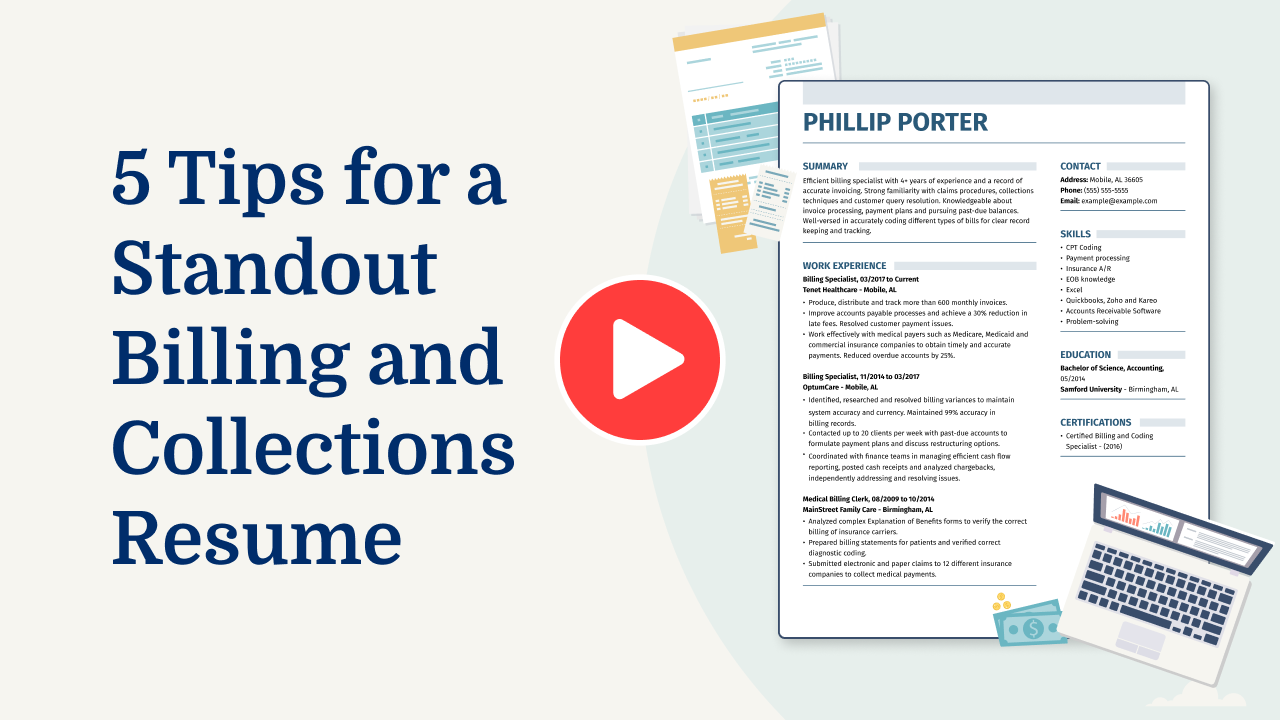
Highlight your most relevant skills
Listing relevant skills when applying for a bookkeeping job is key to standing out to employers. A dedicated skills section on your resume helps you present what you bring to the table quickly and clearly.
It’s important to balance technical skills, like using accounting software or handling financial records, with interpersonal skills, such as communication and attention to detail. These show you’re not only good with numbers but also great at working with others and managing tasks efficiently.
Integrating these skills into your work experience can make an even bigger impact. For example, if you’ve managed accounts payable and receivable in past jobs, mention how you used specific software tools or collaborated with team members for smooth operations. This makes your resume more engaging and paints a fuller picture of your abilities.
Overall, focusing on relevant skills lets employers see you’re equipped for the bookkeeping role. Be clear about what you offer by highlighting both tech know-how and people skills. This approach shows you’re ready to handle job challenges while fitting well into any team environment.
Select a resume format that emphasizes your financial skills, software skill, and accuracy to stand out as a bookkeeper.
Showcase your accomplishments
When showcasing accomplishments for a bookkeeping role, organize your work experience in reverse chronological order. Begin with the most recent position and work backward. Each job entry should include the job title, employer name, location, and employment dates. This structure helps hiring managers quickly see your relevant experience and career progression.
Focus on turning duties into measurable achievements to make your resume stand out. Instead of listing tasks like “managed accounts payable,” emphasize outcomes such as “reduced late payments by 20% through improved tracking systems.”
Use specific numbers whenever possible—highlight cost savings, increased efficiency, or time reductions you’ve achieved. For example, “streamlined monthly reconciliations to save 10 hours per month” shows both skill and impact.
Action-oriented words help bring your accomplishments to life. Words like “optimized,” “implemented,” or “analyzed” show initiative while keeping the focus on core bookkeeping responsibilities and results.
Quantified achievements make it easier for hiring managers to understand how you contributed value in previous roles. This approach not only demonstrates your expertise but also conveys that you are results-driven, which is key in bookkeeping jobs requiring attention to detail and accuracy.
5 bookkeeping work history bullet points
- Managed accounts payable and receivable operations, reducing overdue payments by 25% through improved tracking systems.
- Reconciled monthly bank statements for multiple accounts with an accuracy rate of 99%, ensuring financial transaction integrity.
- Implemented a new bookkeeping software solution that decreased invoice processing time by 40%, improving workflow efficiency.
- Prepared and analyzed quarterly financial reports, identifying cost-saving opportunities that led to a 10% reduction in expenses.
- Coordinated payroll functions for a staff of over 50 employees, achieving timely salary disbursements with zero errors.
Choose a resume template that’s straightforward and clean, with bold headings and readable fonts. Avoid cluttered designs that distract from showcasing your skills and experience effectively.
Write a strong professional summary
A professional summary on a resume serves as the first introduction to hiring managers, providing a snapshot of who you are and what you bring to the table. When crafting your resume, you can decide between including a summary or an objective at the top.
A professional summary is typically three to four sentences long and highlights your experience, skills, and key achievements. It’s especially useful for those with substantial experience, like seasoned bookkeepers. The purpose is to quickly convey your professional identity and value to potential employers.
On the other hand, a resume objective states your career goals and is best suited for entry-level applicants, career changers, or those with employment gaps. While summaries focus on “what I’ve accomplished,” objectives express “what I aim to contribute.”
Now that we’ve clarified the difference between summaries and objectives, let’s look at some examples tailored for various industries and experience levels. See our full library of resume examples for additional inspiration.
Bookkeeping resume summary examples
Entry-level
Recent accounting graduate with a Bachelor of Science in accounting and foundational skills in bookkeeping, accounts receivable, and accounts payable. Completed an internship at a local firm where experience was gained in financial data entry and report generation. Proficient in QuickBooks and Microsoft Excel, eager to contribute strong organizational skills and attention to detail in a dynamic team environment.
Mid-career
Bookkeeper with over seven years of experience managing financial records for small businesses across various industries. Skilled in reconciling bank statements, preparing financial reports, and processing payroll efficiently. Known for accuracy and ability to streamline accounting processes using QuickBooks Online and Xero software. Proven track record of maintaining compliance with industry regulations while fostering productive client relationships.
Experienced
Seasoned bookkeeping professional with nearly two decades of experience overseeing the financial operations of medium-sized enterprises. Expertise includes advanced budget analysis, strategic planning support, and implementation of automated systems that reduced manual workload by 30%. Strong leadership skills demonstrated through mentoring junior staff and leading cross-functional teams to optimize financial workflows. Committed to delivering precise financial insights that drive business success.
Bookkeeping resume objective examples
Entry-level
Driven individual with a strong foundation in accounting principles seeking an entry-level bookkeeping position. Eager to apply analytical skills and attention to detail in maintaining accurate financial records and supporting organizational financial goals.
Career changer
Detail-oriented professional transitioning into bookkeeping, leveraging experience in data management and administrative support. Eager to contribute to a team-focused environment while developing expertise in financial record-keeping and reporting.
Recent graduate
Ambitious recent graduate with coursework in accounting and finance, aiming for a bookkeeping role to use numerical skills and organizational abilities. Committed to learning industry-specific software tools and contributing effectively to the financial health of the organization.
Save time and stress! Use our AI Resume Builder to quickly create a professional-looking resume for bookkeeping jobs.
Match your resume to the job description
Customizing your resume to job descriptions is essential as it helps you stand out and get through applicant tracking systems (ATS). Companies use ATS to scan resumes for specific keywords from job postings. By aligning your resume with these, you boost the chances of catching an employer’s attention.
An ATS-friendly resume incorporates words from the job description that match your skills. This makes it easier for hiring managers to find what they need. When your resume syncs with the job listing, you’re more likely to be noticed.
To identify key terms, carefully review the job posting. Look for repeated skills, qualifications, and responsibilities such as “accounts payable,” “bank reconciliations,” or “financial reporting.” Using exact phrases from the posting can improve your chances of passing applicant tracking systems (ATS).
Incorporate these terms naturally into your resume by rephrasing your experience. For example, if a job posting says “Manage monthly bank reconciliations,” you might write, “Handled monthly bank reconciliations to ensure accurate financial records” in your experience section.
By choosing to customize your resume, you improve its compatibility with ATS software. This increases your likelihood of landing an interview since employers can see how well-suited you are for the bookkeeping role they need filled.
You can use our ATS Resume Checker to ensure your resume has the right keywords and format to catch employers’ attention.
Salary Insights for Bookkeeping
Understanding salary information can help you make informed decisions about your career path or even relocating to a new area. Researching pay trends in your field can give you a clearer picture of your options and goals.
Top 10 highest-paying states for bookkeeping
Bookkeepers earn varying salaries across the United States, with a national average of $49,952. The table below highlights the states where bookkeepers earn the highest compensation.
Our salary information comes from the U.S. Bureau of Labor Statistics’ Occupational Employment and Wage Statistics survey. This official government data provides the most comprehensive and reliable salary information for writers across all 50 states and the District of Columbia. The figures presented here reflect the May 2025 dataset, which is the most recent available as of this publication.
| State | Average Salary |
|---|---|
| District of Columbia | $65,640 |
| California | $59,680 |
| Massachusetts | $58,180 |
| Connecticut | $58,600 |
| New Jersey | $57,480 |
| Washington | $57,650 |
| New York | $57,950 |
| Maryland | $56,080 |
| Alaska | $56,910 |
| Rhode Island | $55,020 |
FAQ
Do I need to include a cover letter with my bookkeeping resume?
Yes, including a cover letter with your bookkeeping resume can give you an edge over other candidates. A cover letter allows you to highlight specific accounting skills and experiences that are particularly relevant to the job you’re applying for.
For example, if the company uses specific accounting software like QuickBooks or Xero, you can mention your skill in these platforms and how you’ve used them to improve financial processes.
You could also emphasize any special projects or achievements, such as streamlining expense reporting or improving accuracy in payroll management.
Consider using tools like our Cover Letter Generator for tailored guidance or explore our collection of cover letter examples for bookkeeping roles to refine your approach further.
How long should a bookkeeper’s resume be?
For a bookkeeper, aiming for a one-page resume is usually best. This helps focus on your most relevant skills and experiences, such as skill with accounting software, attention to detail, and expertise in managing financial records.
If you have extensive experience or specialized certifications that are highly relevant to bookkeeping, extending to a two-page resume is acceptable. Just make sure every detail included is relevant and showcases your efficiency in managing financial tasks.
To ensure you’re covering all the necessary points without overloading your resume, explore our guide on how long a resume should be for examples and tips tailored to different career stages.
How do you write a bookkeeping resume with no experience?
For a bookkeeping resume with no experience, emphasize your skills, education, and any coursework or volunteer work that shows you can manage financial records effectively. Here are a few tips on how to write a resume with no experience:
- Emphasize relevant education: Start with your educational background. If you took accounting or finance courses, detail them with the institution’s name, dates attended, and any honors received.
- Highlight transferable skills: Bookkeeping requires attention to detail, organizational skills, and skills in software like Excel or QuickBooks. List these skills prominently and provide examples if possible.
- Include relevant projects or volunteer work: Mention any volunteer work or school projects where you handled budgets, tracked expenses, or managed data. Describe what you did and the outcomes achieved.
- Showcase soft skills: Communication and problem-solving are important in bookkeeping. Highlight experiences where you’ve demonstrated these abilities effectively.
Consider creating a functional resume format that emphasizes skills over chronological experience. Tailor your resume for each job application by aligning your capabilities with the job description.
Rate this article
Bookkeeping
Share this page
Additional Resources

The Illusion of Wage Growth: Where Paychecks Stretch the Farthest
U.S. wages have climbed at one of the fastest rates in modern history. Between 2020 and 2024, the average American worker’s pay rose from about $64,000 to $75,600, an 18%
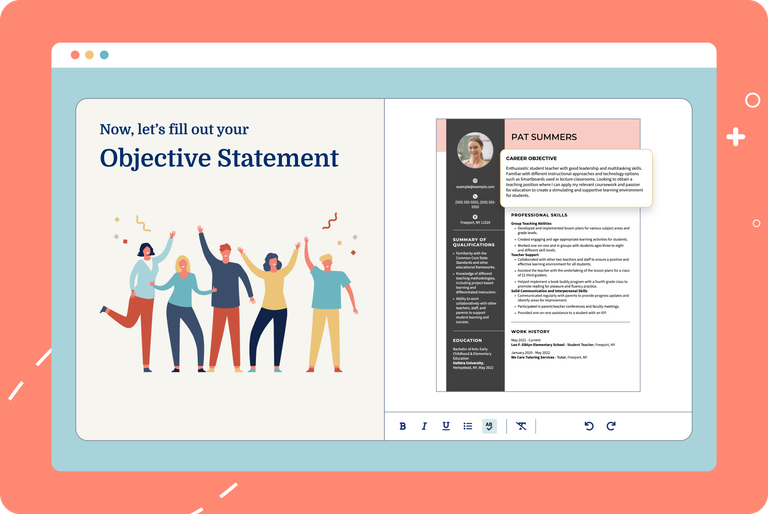
100+ Resume Objective Statement Examples & Best Practices
In just a sentence or two, a resume objective statement tells hiring managers the role or career path you’re aiming for and the unique skills and value you bring to

150+ Skills for a Resume: Examples for Any Job
Crafting a standout resume starts with highlighting the skills and qualifications that demonstrate your fit for the role. But in a crowded job market, knowing which abilities will actually catch
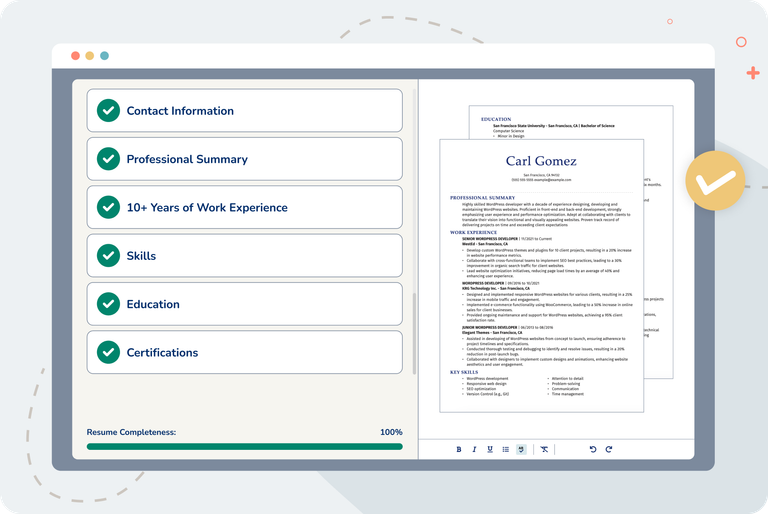
When to Use a Two Page Resume (With Examples & Formatting Tips)
If you’ve spent years building your skills, growing in your career, and racking up accomplishments, a one-page resume might not cut it. A two-page resume gives you space to present a
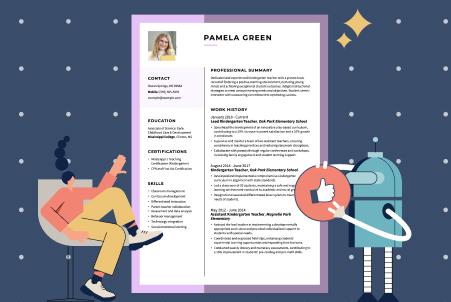
How to Make an ATS Friendly Resume (Templates & Guide)
In today’s fast-paced hiring climate, many employers use applicant tracking systems (ATS) to organize, store, and screen candidate information. Optimizing your resume for ATS is essential for ensuring your application passes
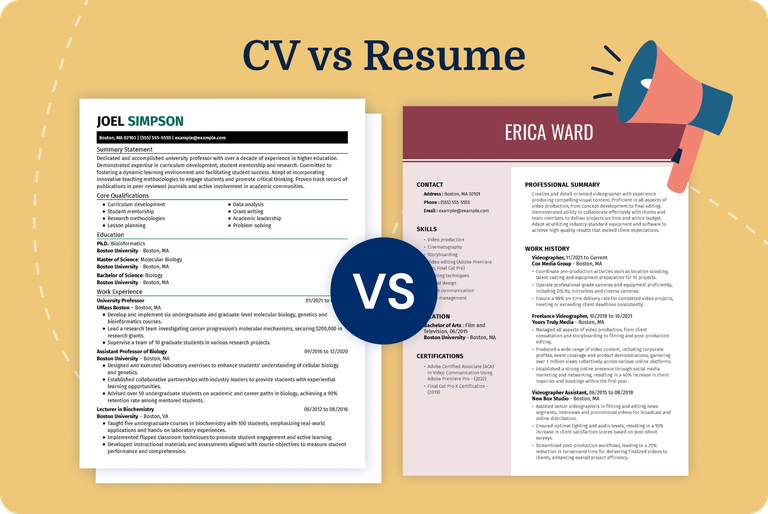
CV vs Resume: What’s The Difference?
Confused about the difference between a resume and a CV? You’re not alone! While both documents help you land a job, they vary in content, structure, and formatting. In this guide, we’ll
